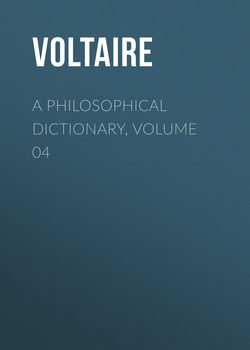Читать книгу A Philosophical Dictionary, Volume 04 - Voltaire, Вольтер - Страница 10
DANTE
ОглавлениеYou wish to become acquainted with Dante. The Italians call him divine, but it is a mysterious divinity; few men understand his oracles, and although there are commentators, that may be an additional reason why he is little comprehended. His reputation will last because he is little read. Twenty pointed things in him are known by rote, which spare people the trouble of being acquainted with the remainder.
The divine Dante was an unfortunate person. Imagine not that he was divine in his own day; no one is a prophet at home. It is true he was a prior – not a prior of monks, but a prior of Florence, that is to say, one of its senators.
He was born in 1260, when the arts began to flourish in his native land. Florence, like Athens, abounded in greatness, wit, levity, inconstancy, and faction. The white faction was in great credit; it was called after a Signora Bianca. The opposing party was called the blacks, in contradistinction. These two parties sufficed not for the Florentines; they had also Guelphs and Ghibellines. The greater part of the whites were Ghibellines, attached to the party of the emperors; the blacks, on the other hand, sided with the Guelphs, the partisans of the popes.
All these factions loved liberty, but did all they could to destroy it. Pope Boniface VIII. wished to profit by these divisions in order to annihilate the power of the emperors in Italy. He declared Charles de Valois, brother of Philip the Fair, king of France, his vicar in Italy. The vicar came well armed and chased away the whites and the Ghibellines and made himself detested by blacks and Guelphs. Dante was a white and a Ghibelline; he was driven away among the first and his house razed to the ground. We may judge if he could be for the remainder of his life, favorable towards the French interest and to the popes. It is said, however, that he took a journey to Paris, and, to relieve his chagrin turned theologian and disputed vigorously in the schools. It is added that the emperor Henry VIII. did nothing for him, Ghibelline as he was, and that he repaired to Frederick of Aragon, king of Sicily, and returned as poor as he went. He subsequently died in poverty at Ravenna at the age of fifty-six. It was during these various peregrinations that he composed his divine comedy of "Hell, Purgatory, and Paradise."
[Voltaire here enters into a description of the "Inferno," which it is unnecessary to insert, after the various translations into English. The conclusion, however, exhibiting our author's usual vivacity, is retained.]
Is all this in the comic style? No. In the heroic manner? No. What then is the taste of this poem? An exceedingly wild one, but it contains verses so happy and piquant that it has not lain dormant for four centuries and never will be laid aside. A poem, moreover, which puts popes into hell excites attention, and the sagacity of commentators is exhausted in correctly ascertaining who it is that Dante has damned, it being, of course, of the first consequence not to be deceived in a matter so important.
A chair and a lecture have been founded with a view to the exposition of this classic author. You ask me why the Inquisition acquiesces. I reply that in Italy the Inquisition understands raillery and knows that raillery in verse never does any harm.
